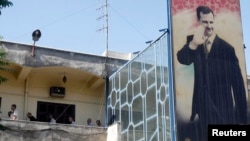Syrian government forces have detained at least 215,000 Syrians since the beginning of the uprising against President Bashar al-Assad, now in its fourth year, according to a rights group, which is urging the International Criminal Court to mount prosecutions for crimes against humanity.
The Syrian Network for Human Rights (SNHR), in a new report, say detainees are held in a sprawling prison and detention center underworld, where torture and starvation are systemic. With so many detainees, “government forces started using, from 2012, schools, stadiums and villas as detention facilities” in a network of camps reminiscent of the Nazi era in Germany.
More than 100 prisons and detention centers are believed to be operating.
The report by SNHR, an independent non-profit that relies on activists on the ground to gather information, says it has documented the details of 110,000 of the 215,000 it estimates to have been detained since the start of the Syrian conflict in March of 2011. The worst abuses are occurring in detention centers overseen by local militias from the so-called National Defense Army and Popular Committees, the report’s authors assert.
Several rights groups have issued studies this year documenting extensive abuse and the use of torture in official prisons run by the Assad government’s four main security branches, as well as at the secret detention centers controlled by paramilitaries called shabiha, which are often recruited from criminal gangs and are almost always members of Assad’s minority Alawite Muslim sect.
Harsh conditions, deaths in custody
Earlier this year, Human Rights Watch documented the accounts of four former detainees who described deaths in custody and harsh conditions at the Sednaya military prison.
Their testimonies closely matched allegations of mass deaths in custody by a Syrian military defector, who photographed an estimated 11,000 bodies in military hospitals in Damascus. In January, a team of senior international lawyers and forensic experts published a report concluding that Assad’s security branches had been engaged in systematic torture and the killing of detainees.
The SHNR report released Wednesday offers a higher estimate of the total detained over the past three-and-half-years than other rights groups, which have put the number closer to 200,000.
Secret detention centers
Much of the report is focused on a secret detention center at Der Shmiel, which the authors say is run by up to 1,500 shabiha drawn from surrounding villages. The camp is located in the countryside 20 kilometers from the town of Misyaf. A former prisoner's testimony suggests the camp has two functions - to inflict torture on dissidents and their families and anyone suspected of disloyalty held at the camp, and to trade prisoners for cash.
According to the former prisoner, who was held for three months at Der Shmiel, about 2,500 detainees are at the camp - 250 children and 400 women among them. Local residents told SNHR researchers they had seen bodies dumped from the camp bearing signs of beatings and torture. The detainee said he was regularly lashed with one of his hands tied to the ceiling, and without his feet being able to touch the ground. “I heard the sound of children and women screaming and men being tortured all the time,” he told SNHR researchers.
He said most of the detainees “weren’t active in the revolution, but they won’t be released until their families pay the camp a lot of money.” The released prisoner was freed after his family “sold our house and rented another, sold land I owned, and borrowed a lot of money to pay the camp 25 million Syrian pounds ($15,000).”
UN criticized
SNHR criticizes the United Nations for not enforcing a series of resolutions that strongly condemn the arbitrary detention and torture of civilians by Syrian authorities. “The Security Council seems completely helpless to take any action against the ruling regime in Syria after four years of ceaseless widespread killing,” the report concludes.
SHNR says the U.N. should assist rights groups to file a lawsuit with the ICC, and it recommends that a special international tribunal be established similar to the one formed to deal with crimes committed during the civil war in Yugoslavia.

